(完整word版)特殊疑问词+todo
(完整word版)2016年英语全国卷2及答案
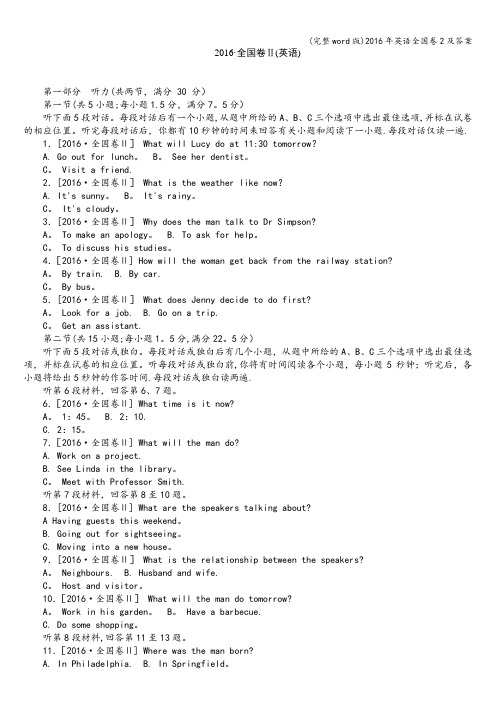
2016·全国卷Ⅱ(英语)第一部分听力(共两节,满分 30 分)第一节(共5小题;每小题1.5分,满分7。
5分)听下面5段对话。
每段对话后有一个小题,从题中所给的A、B、C三个选项中选出最佳选项,并标在试卷的相应位置。
听完每段对话后,你都有10秒钟的时间来回答有关小题和阅读下一小题.每段对话仅读一遍.1.[2016·全国卷Ⅱ] What will Lucy do at 11:30 tomorrow?A. Go out for lunch。
B。
See her dentist。
C。
Visit a friend.2.[2016·全国卷Ⅱ] What is the weather like now?A. It's sunny。
B。
It's rainy。
C。
It's cloudy。
3.[2016·全国卷Ⅱ] Why does the man talk to Dr Simpson?A。
To make an apology。
B. To ask for help。
C。
To discuss his studies。
4.[2016·全国卷Ⅱ] How will the woman get back from the railway station?A。
By train. B. By car.C。
By bus。
5.[2016·全国卷Ⅱ] What does Jenny decide to do first?A。
Look for a job. B. Go on a trip.C。
Get an assistant.第二节(共15小题;每小题1。
5分,满分22。
5分)听下面5段对话或独白。
每段对话或独白后有几个小题,从题中所给的A、B、C三个选项中选出最佳选项,并标在试卷的相应位置。
听每段对话或独白前,你将有时间阅读各个小题,每小题5秒钟;听完后,各小题将给出5秒钟的作答时间.每段对话或独白读两遍.听第6段材料,回答第6、7题。
(完整word版)too...to...-与-enough...to...-与-so...that...的区别

too...to... 与enough...to... 与so...that...的区别too+adj./adv. to+v.太...而不能做某事例:He is too young to go to school. 他年纪太小还不能上学。
2.adj./adv.+enough to +v.足够...而能做某事例:He is old enough to go to school. 他足够大了能上学了/他已到了上学的年龄了。
3.so +adj./adv.+that从句如此...以致例:He is so old that he can go to school.通常来说,这三种句型可用于同义句转换,具体如下:too...to... =not 反义词enough to =so...that 否定句例:He is too young to go to school.= He is not old enough to go to school.= He is so young that he can't go to school.too …to …. ; not …enough to…Step 1 看图说话利用课本P36页的图画和提示词练说too…to do 和not … enough to do 句子。
如:1. The snake / dangerous/ hold . / The boy not braveThe snake is too dangerous to hold. The boy is not brave enough to hold it .板书too…to do 和not … enough to do并让学生明确这两个短语的中文意思是“太… 而不能…”。
提醒学生观察这两个句子结构中的形容词用什么形式,to do中的do 可否变换形式。
在准确理解的基础上继续看图说话。
2. The girl / short / get on the elephant. / she / not / tall .3. The elephant / heavy / carry. / The boy / not strong.4. The elephant / fat / go through the gate. / The gate / not wide.5. The monkey / far away / get the bananas. / The bananas / not near.6. The cat/ slow/ catch the bird./ It / cannot run/ fast .Step 2 抛砖引玉板书The snake is too dangerous to hold. The boy is not brave enough to hold it . (改为同义句) The snake is so dangerous that the boy _________ hold it.学生在理解的基础上探求答案,在探求答案的过程中获得新知。
中考英语八大时态总结与练习(word版)

中考英语八大时态总结与练习(word版)特殊式:特殊疑问词+be+主语实义动词型:肯定式:主语+行为动词(注意人称三单形式)+其他否定式:主语+do n’t/doesn’t+行为动词+其他疑问式:一般式:Do/Does+主语+行为动词原形+其他特殊式:特殊疑问词+do/does+主语+谓语小试牛刀:写出下列动词的第三人称形式wash:match:study:finish:go:snow:carry:stop:see:drive:let: teach:keep:join: put:do:drink:toy:play: begin:take:run:fly:talk: stay:look:watch:think:carry:fix:单项选择1. There an English film at the cinema now.A:is B:are C:am D:be2. The picture nice.A:look B:looks C:looked D:be look3. He sits down and soon asleep.A:fall B:falling C:falled D: falls4. The water sweet.A:drinking B:drinks C:drink D:to drink5. I up at six but Mike up at sevenA:get,gets B:get ,get C:gets,get D:getting, to get6. My father for eight hours every day.A:working B:works C:work D:to work7. Uncle Wang never English, because he know how to say it.A:speak,doesn’t B:speak,don’t C:speaks,don’tD:speaks,doesn’t8. On Sunday my daughter watching TV and my son to playfootball with his friends.A:like,want B:likes,want C:like,wants D:likes,wants 9. Su Yang usually some clothes on Sunday.A:washed B:washs C:washes D:washing 10. Su Hai and Su Yang eight lessons this term.A:have B:has C:haves D:having 用所给词的正确形式填空A. We often (not play)on the playground.B. you (brush) yourteeth every day.C. How many lessons your classmate (have) on Sunday.D. It (take) me two hours to finish my homework every day.E. The child often (watch) TV in the evening.F. What (do) he usually (do) after school.G. John (study) Math , Chinese ,English ,Science and Art at school. H. Mr. Wang often (go) to Shanghai.I. There (be) a football match on TV every morning.J. We (not watch)TV on Monday.句式训练➢Do you like to play football after school?肯定句肯定/否定回答:➢I have many books.否定句:一般疑问句:肯定回答:否定回答:➢Nancy doesn’t run fast.肯定句:➢I usually play football on Friday afternoon.否定句:一般疑问句:特殊疑问句:肯定/否定回答:➢Tom does his homework at home. 否定句:一般疑问句:特殊疑问句:➢Mike has two letters for him.否定句:一般疑问句:特殊疑问句:否定回答:判断正误1. Is your brother speakEnglish?2. Does he likes goingfishing?3. Jane do his homework everymorning.4. He like play basketball withhis friends.5. We eats dinner at six and go to bedat eleven.6. My dog runsfast.7. He speak Englishvery well.8. What do they usually do onSaturday.9. My mother don’t have breakfast thismorning.10. I like reading books on the libraryevery day.中考真题1.Jenny! Do you know that one-third of the boys in our class the singer ZhangShao Han?A. likeB. likesC. liking2. The sense of happiness will increase if you what youlike to do. A. do B. did C. will do3. Betty will ring me up when shein Beijing.A. arriveB. arrivesC.arrived D. will arrive4. If you your homework, you can go out toplay football.5.Now my father his bike to work every day instead ofdriving. A. ride B. r od e C. rides D. willride6. This girl is rea d y t o help p eo pl e an y time. Wh e n sh e is on t h e bu s,sh eal w a y sher seat to someone inneed.A. givesB. giveC. gaveD. giving概念: 一般过去时表示过去某个时间収生的动作或存在的状态. Eg: I got up at seven yesterday表示过去经常収生的动作或存在的状态. Eg: he always went to school by car last term标志性词语:yesterday ,l ast month/year/week/night ,t he day before yesterday ,i n the past ,at that time ,two days ago ,just n ow……..动词过去时的变化规则: 一般在词尾直接+ed play ——played以 e 结尾的动词直接+d taste —— tasted末尾三个字母以“辅+元+辅”且为重读闭音节,双写末尾辅音+ed stop ——stopped 以辅音字母+y ,改 y 为 i 再+ed study ——studied 不规则动词过去式: am/is: a re: do : see: sa y:give: eat: w rit e: sp en d : get:take:sp eak:drin k:g o : r un : rid e: sle ep: c o me: sin g: swim: s t and : has/ha ve: pu t: sit : rea d : 结构:Be 型 肯定式:主语+be 动词(was/were )+其他 否定式:主语+wasn ’t/weren ’t+其他 疑问式:Be 动词+主语+其他(一二人称互换,第三人称不变) 特殊疑问句:特殊疑问词+was/were+主语+其他实义动词型 肯定式:主语+动词过去式+其他否定式:主语+didn’t+动词原形+其他疑问式:Did+主语+动词原形+其他特殊疑问句:特殊疑问词+did+主语+动词原形+其他用所给单词正确形式填空◆W e (enjoy) ourselves at the party last night.◆J ack (study) for the English test lastSunday.◆ you (go) to the Great Wall last year?◆W hat day (be) it yesterday?◆T he old man (be)ill and went to seea doctor.◆W e (have) a party last night.◆W e (visit) the museum and went home.◆— How (be) the students? — They were very friendly.◆My mother (not do) housework yesterday.◆—he (have) lunch at nine? —No, he did n’t.◆T hey (buy) a guitar yesterday.◆t he cat (eat)a bird yesterday night.◆T hey (play)chess in the classroom last PE lesson.◆N ancy (pick)up orange on the farm last week.◆M y mother (cook)a nice food last spring festival.◆I(be)at school just now.◆H e (be)at the camp last week.◆T he mobile phone (be)on the table yesterday evening.◆I(make)a model ship with Mike yesterday.◆W hat (do)you do last month.单项选择( ) 1. Lee his mobile phone at home. A. leave B. leaves C. leaved D. left ( ) 2. he a good rest? No, he didn’t.A. Do, hadB. Did, haveC. Did, hadD. Was, had( ) 3. As soon as he , he to his family.A. arrived, writesB. arrived, writtenC. arrived, wroteD. arriveds, write( ) 4. Mr. Black was late because he his way.A. lostedB. loseC. losesD. lost( ) 5. When Lee school this morning?A. did, got toB. did, get toC. did, getD. did, got( ) 6. Will you please say it again? Iquite you.A. didn’t, hearB. don’t, heardC.didn’t, heard D. don’t, hear ( ) 7. you at six o’c lock yesterday?A. Do ,get upB. Did, get upC. Do, got upD. Did, got up( ) 8.What did you see ?A. nowB. every dayC. these daysD. just now( ) 9.He went into the room and thedoor.A. lockB. lockingC. locksD. locked( ) 10. —What y ou last week? —I bought a bag.A. did ,buyB. did , boughtC. do, buyD. do, bought( ) 11. —he his lunch? — Yes, he did.A. Does ,hasB. Does, haveC. Did, haveD. Did, had( )12.—Did the thieves into the car? —No, they .A. fell, did n’tB. fall(落下), didC. jump(跳), didn’tD. jump, did( ) 13. -When did May come back from Hong Kong?-She fromHong Kong lastFriday.A. come backB. comes backC.returned back D. came back( ) 14. she this dictionary in thebookshop nearby last week? A. Did, buy B. Does, buy C . Did, bought D. Does, buys ( ) 15. He to the station this morning and was for the train.A. hurry, in time B. hurries, on time C. hurried, in time D. hurried, at time句型转换1. Frank read an interesting book about history. (一般疑问句)Frank an interesting book about history?2. Thomas spent RMB 10 on this book. (否定句)Thomas RMB 10 on this book.3. I didn’t have any friends. (一般疑问句)have friends?4. She watched TV after supper(划线部分提问)she after supper.5. There was some orange in the fridge.(一般疑问句)there_ orange in the fridge?改错题1. How is Jane yesterday?2. He go to school by bus last week.3. He often goes home at 6:00 last month.4. I can fly kites seven years ago.5. Did you saw him just now.6. Tom wasn’t watch TV last night.7. I didn’t my homework yesterday. 8. He wait for you three hours ago.9. Who find it just now ? 10. What did helast week?综合训练1. They read English last night.否定句:一般疑问句:肯定/否定回答:划线部分提问:2. She didn’t buy a dictionary last week.肯定句:一般疑问句:肯定/否定回答:划线部分提问:概念:一般将来时现在看将要収生的动作或存在的状态.标志性词语:Tomorrow,soon,next year,next year / week / month, in a few days, in the future, this afternoon,the day after tomorrow,one hour later,tomorrow morning。
“特殊疑问词 动词不定式”的用法归纳
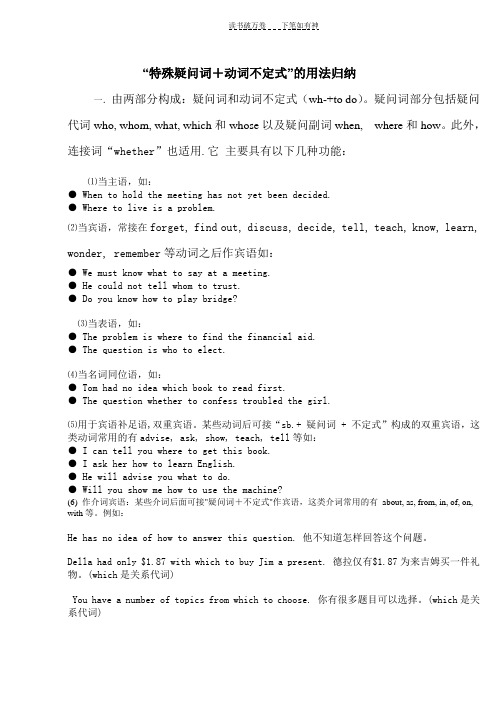
“特殊疑问词+动词不定式”的用法归纳一.由两部分构成:疑问词和动词不定式(wh-+to do)。
疑问词部分包括疑问代词who, whom, what, which和whose以及疑问副词when, where和how。
此外,连接词“whether”也适用.它主要具有以下几种功能:⑴当主语,如:● When to hold the meeting has not yet been decided.● Where to live is a problem.⑵当宾语,常接在forget, find out, discuss, decide, tell, teach, know, learn, wonder, remember等动词之后作宾语如:● We must know what to say at a meeting.● He could not tell whom to trust.● Do you know how to play bridge?⑶当表语,如:● The problem is where to find the financial aid.● The question is who to elect.⑷当名词同位语,如:● Tom had no idea which book to read first.● The question whether to confess troubled the girl.⑸用于宾语补足语,双重宾语。
某些动词后可接“sb.+ 疑问词 + 不定式”构成的双重宾语,这类动词常用的有advise, ask, show, teach, tell等如:● I can tell you where to get this book.● I ask her how to learn English.● He will advise you what to do.● Will you show me how to use the machine?(6) 作介词宾语:某些介词后面可接"疑问词+不定式"作宾语,这类介词常用的有about, as, from, in, of, on, with等。
(完整word版)too...to...-与-enough...to...-与-so...that...的区别

too...to... 与enough...to... 与so...that...的区别too+adj./adv. to+v.太...而不能做某事例:He is too young to go to school. 他年纪太小还不能上学。
2.adj./adv.+enough to +v.足够...而能做某事例:He is old enough to go to school. 他足够大了能上学了/他已到了上学的年龄了。
3.so +adj./adv.+that从句如此...以致例:He is so old that he can go to school.通常来说,这三种句型可用于同义句转换,具体如下:too...to... =not 反义词enough to =so...that 否定句例:He is too young to go to school.= He is not old enough to go to school.= He is so young that he can't go to school.too …to …. ; not …enough to…Step 1 看图说话利用课本P36页的图画和提示词练说too…to do 和not … enough to do 句子。
如:1. The snake / dangerous/ hold . / The boy not braveThe snake is too dangerous to hold. The boy is not brave enough to hold it .板书too…to do 和not … enough to do并让学生明确这两个短语的中文意思是“太… 而不能…”。
提醒学生观察这两个句子结构中的形容词用什么形式,to do中的do 可否变换形式。
在准确理解的基础上继续看图说话。
2. The girl / short / get on the elephant. / she / not / tall .3. The elephant / heavy / carry. / The boy / not strong.4. The elephant / fat / go through the gate. / The gate / not wide.5. The monkey / far away / get the bananas. / The bananas / not near.6. The cat/ slow/ catch the bird./ It / cannot run/ fast .Step 2 抛砖引玉板书The snake is too dangerous to hold. The boy is not brave enough to hold it . (改为同义句) The snake is so dangerous that the boy _________ hold it.学生在理解的基础上探求答案,在探求答案的过程中获得新知。
特殊疑问词todo图文稿

特殊疑问词t o d o集团文件发布号:(9816-UATWW-MWUB-WUNN-INNUL-DQQTY-1. 我们可以用“疑问词+动词不定式”结构做动词的宾语。
疑问词包括疑问代词 what 、which、who和疑问副词how 、when、where 等。
但所有疑问词中,只有why不可以和动词不定式连用。
2. 常和“疑问词+动词不定式”结构连用的动词及短语有:know、learn、see、hear、ask、tell、advise、decide、explain、find out.另外,“疑问词+动词不定式”结构前,有时也可以是 sure 、clear 等的形容词翻译:(1)我不知道该做什么。
I don’t know what to do.(2)你怎么知道在那里可以找到我How did you know where to find me(3)我不确定下面该做什么。
I am not sure what to do next.3.注意:(1)有些动词,如advise, ask, show, teach, tell等,其后可以接双宾语。
(2)有些疑问词,如what, which, whose, how many, how much等,其后先接一个名词再接动词不定式。
(3)“疑问词+动词不定式”结构在句子中可以做主语和表语。
(4)“疑问词+动词不定式”结构可以改写成由该疑问词引导的从句。
练习:(1)Sandy 问我怎样去那。
Sandy asks me how to go there.(2)他不知道该带多少钱。
He doesn’t know how much money to take.(3)何时开始是一个问题。
When to start is a question.(4)我的问题是在哪里可以找到答案。
My question is where to find the answer.一、单项选择()1. —I will go to Harbin for my summer vacation. What about you—I haven’t decided where ______.A. goB. wentC. goingD. to go()2. I haven’t decided when _____a holiday yet.A. tookB. takingC. to takeD. take()3.—Can I help you ,dear?—Yeah, I do not know_____ a banana milk shake. Maybe you can help me.A. what to doB. when to makeC. how to makeD. why to do二、句型转换(同义句转换)1. He showed me how I can start the online tour.She showed me the online tour.2. I don’t know what he said.I don’t know _______ ______ _______.3. Tom forgot when he met his friendsTom forgot _____ ______ ______his friends.4. Sandy is wondering where she asks for help.Sandy is wondering _______ ________ ________ for help.5. Amy does not know how she writes the report.Amy does not know _____ _______ _______ the report。
Grammar 语法讲义--- must和have to以及特殊疑问词 to do-牛津译林版

Unit4 Grammar 语法讲义--- must和have to以及特殊疑问词+ to do一. must和have to的区别I. must 表示主语“必须”做某事,强调说话人的主观意愿;必须做某事(主观意愿)must do sth.禁止做某事mustn’t do sth.例1:—Must I keep the door open? —Yes, you must.例2:—Must I bring my homework when I come here?—No, you needn’t.—No, you don’t have to.II. have to 强调的是客观需要,意思是“不得不,得做某事”。
不得不做某事(客观需要)have to do sth.不必做某事don’t have to do sth.have to 有人称和数的变化: has to, had to, will have to。
注意:must表示必须,其否定形式为needn’t或don’t have to,而不是mustn’t。
mustn’t 表示禁止。
二. 拓展:情态动词的用法情态动词用法常考的三种情况:表示可能性、猜测:can (一般表示对客观真理的猜测,不用于现实事件的猜测)----无否定could(can的过去式)易错点: may(表示对事件的猜测)----否定may not(可能不)---过去式might must (一定)-----否定-can’t(不可能)例1:There can be aliens in the outer space. ------表示对科学真理的猜测例2:He can be Lily’s father. ----错,can不用于现实事件的猜测改正:He may be Lily’s father.例2:There is light in Mr. Li’s office. He _________ (一定) be inside. -----must be例3:Mr. Li is on business in Shanghai, so he __________ (不可能) be at home.---can’t be 例4:他可能不是李老师。
特殊疑问词动词不定式的用法归纳
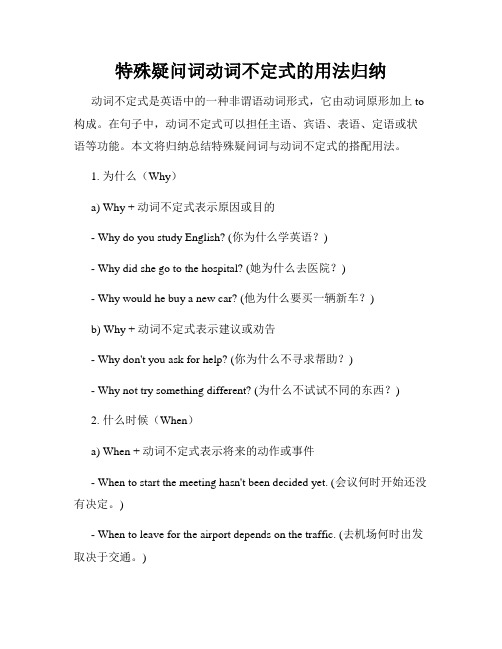
特殊疑问词动词不定式的用法归纳动词不定式是英语中的一种非谓语动词形式,它由动词原形加上to 构成。
在句子中,动词不定式可以担任主语、宾语、表语、定语或状语等功能。
本文将归纳总结特殊疑问词与动词不定式的搭配用法。
1. 为什么(Why)a) Why + 动词不定式表示原因或目的- Why do you study English? (你为什么学英语?)- Why did she go to the hospital? (她为什么去医院?)- Why would he buy a new car? (他为什么要买一辆新车?)b) Why + 动词不定式表示建议或劝告- Why don't you ask for help? (你为什么不寻求帮助?)- Why not try something different? (为什么不试试不同的东西?)2. 什么时候(When)a) When + 动词不定式表示将来的动作或事件- When to start the meeting hasn't been decided yet. (会议何时开始还没有决定。
)- When to leave for the airport depends on the traffic. (去机场何时出发取决于交通。
)3. 如何(How)a) How + 动词不定式表示方式、方法或方式- How to solve this problem is yet to be determined. (如何解决这个问题还没有确定。
)- How to use this machine is explained in the manual. (如何使用这台机器在说明书中有解释。
)4. 为何(Why)a) Why + 动词不定式表示目的- Why take the risk if it's unnecessary? (如果没有必要,为什么冒险?) - Why waste time on something that doesn't matter? (为何在无关紧要的事情上浪费时间?)5. 何时(When)a) When + 动词不定式表示计划或打算- When to meet again will be discussed at the next meeting. (何时再次见面将在下次会议上讨论。
(完整版)特殊疑问词+动词不定式结构
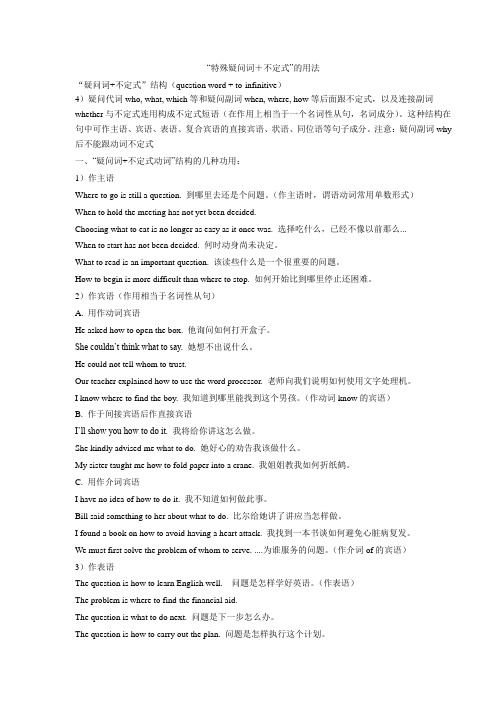
“特殊疑问词+不定式”的用法“疑问词+不定式”结构(question word + to-infinitive)4)疑问代词who, what, which等和疑问副词when, where, how等后面跟不定式,以及连接副词whether与不定式连用构成不定式短语(在作用上相当于一个名词性从句,名词成分)。
这种结构在句中可作主语、宾语、表语、复合宾语的直接宾语、状语、同位语等句子成分。
注意:疑问副词why 后不能跟动词不定式一、“疑问词+不定式动词”结构的几种功用:1)作主语Where to go is still a question. 到哪里去还是个问题。
(作主语时,谓语动词常用单数形式)When to hold the meeting has not yet been decided.Choosing what to eat is no longer as easy as it once was. 选择吃什么,已经不像以前那么...When to start has not been decided. 何时动身尚未决定。
What to read is an important question. 该读些什么是一个很重要的问题。
How to begin is more difficult than where to stop. 如何开始比到哪里停止还困难。
2)作宾语(作用相当于名词性从句)A. 用作动词宾语He asked how to open the box. 他询问如何打开盒子。
She couldn’t think what to say. 她想不出说什么。
He could not tell whom to trust.Our teacher explained how to use the word processor. 老师向我们说明如何使用文字处理机。
I know where to find the boy. 我知道到哪里能找到这个男孩。
(完整版)英语特殊疑问词的用法
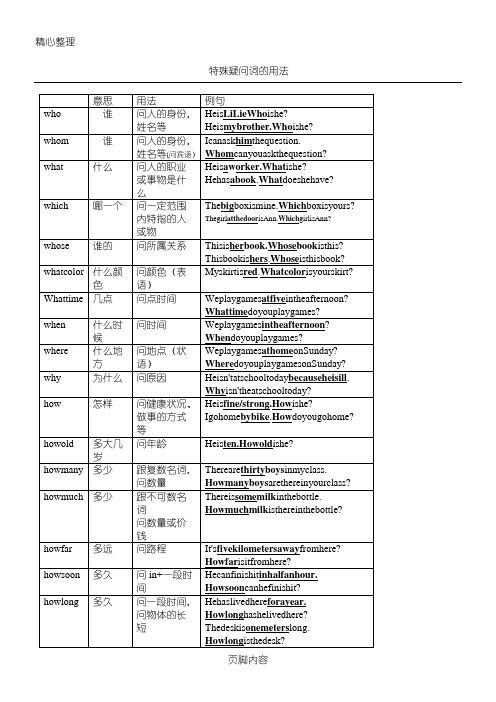
精心整理特殊疑问词的用法who whom what意思 谁谁什么which 哪一个whose 谁的whatcolor 什么颜 色Whattime 几点when where why什么时 候 什么地 方 为什么how怎样howold 多大几 岁howmany 多少howmuch 多少howfar 多远 howsoon 多久 howlong 多久用法例句问人的身份, HeisLiLieWhoishe?姓名等Heismybrother.Whoishe?问人的身份, Icanaskhimthequestion.姓名等(问宾语) Whomcanyouaskthequestion?问人的职业 Heisaworker.Whatishe?或事物是什 Hehasabook.Whatdoeshehave?么问一定范围 Thebigboxismine.Whichboxisyours?内特指的人 ThegirlatthedoorisAnn.WhichgirlisAnn?或物问所属关系 Thisisherbook.Whosebookisthis?Thisbookishers.Whoseisthisbook?问颜色(表 Myskirtisred.Whatcolorisyourskirt?语)问点时间Weplaygamesatfiveintheafternoon?Whattimedoyouplaygames?问时间Weplaygamesintheafternoon?Whendoyouplaygames?问地点(状 WeplaygamesathomeonSunday?语)WheredoyouplaygamesonSunday?问原因Heisn'tatschooltodaybecauseheisill.Whyisn'theatschooltoday?问健康状况、 Heisfine/strong.Howishe?做事的方式 Igohomebybike.Howdoyougohome?等问年龄Heisten.Howoldishe?跟复数名词, Therearethirtyboysinmyclass.问数量Howmanyboysarethereinyourclass?跟不可数名 Thereissomemilkinthebottle.词Howmuchmilkisthereinthebottle?问数量或价钱问路程It'sfivekilometersawayfromhere?Howfarisitfromhere?问 in+一段时 Hecanfinishitinhalfanhour.间Howsooncanhefinishit?问一段时间, Hehaslivedhereforayear.问物体的长 Howlonghashelivedhere?短Thedeskisonemeterslong.Howlongisthedesk?页脚内容精心整理howoften 多久 问频率Igotoseemyparentsonceamonth.(一次)Howoftendoyougotoseeyourparents?对画线部分提问,除了要注意选择正确的疑问词外,还要注意语序的运用。
“特殊疑问词 动词不定式”的用法归纳

“特殊疑问词+动词不定式”的用法归纳一.由两部分构成:疑问词和动词不定式(wh-+to do)。
疑问词部分包括疑问代词who, whom, what, which和whose以及疑问副词when, where和how。
此外,连接词“whether”也适用.它主要具有以下几种功能:⑴当主语,如:● When to hold the meeting has not yet been decided.● Where to live is a problem.⑵当宾语,常接在forget, find out, discuss, decide, tell, teach, know, learn, wonder, remember等动词之后作宾语如:● We must know what to say at a meeting.● He could not tell whom to trust.● Do you know how to play bridge?⑶当表语,如:● The problem is where to find the financial aid.● The question is who to elect.⑷当名词同位语,如:● Tom had no idea which book to read first.● The question whether to confess troubled the girl.⑸用于宾语补足语,双重宾语。
某些动词后可接“sb.+ 疑问词 + 不定式”构成的双重宾语,这类动词常用的有advise, ask, show, teach, tell等如:● I can tell you where to get this book.● I ask her how to learn English.● He will advise you what to do.● Will you show me how to use the machine?(6) 作介词宾语:某些介词后面可接"疑问词+不定式"作宾语,这类介词常用的有about, as, from, in, of, on, with等。
(完整版)动词后加todo和doing的记忆口诀(可编辑修改word版)

动词后加to do 和doing 的记忆口诀一、只能用动名词(ing)作宾语[口诀]考虑建议盼原谅,承认推迟没得想。
避免错过继续练,否定完成停欣赏。
禁止想象才冒险,不禁介意弃逃亡。
consider 考虑suggest 建议/advocate 提倡主张look forward to 盼望forgive 原谅/pardon 原谅acknowledge 承认/admit 承认postpone 延迟延期/delay 延迟/defer 拖延recall 回想/fancy 幻想爱好avoid 避免miss 错过keep 保持practise 练习实践deny 否认complete 完成/finish 完成cease 停止/quit 放弃停止appreciate 感激欣赏forbid 禁止/prevent 阻止imagine 设想risk 冒险can’t help 不禁mind 介意escape 逃跑逃避加动名词的动词大集合口诀(原创)故事是以一个家长的口吻讲述:我有时很感激欣赏(appreciate)我的孩子,但总是避免(avoid) 承认(admit)这一点,请允许(allow)我寻求您的建议(advise),{名词为advice}您考虑(consider)后告诉我如何克服这个小缺点。
还有一件事,我的孩子总是拖延(delay)他不喜欢(dislike) 的事,不可否认(deny)这就是逃避(escape)。
老师原谅(excuse)了他,但是告诫他要喜欢(enjoy)自己的该做的事。
我曾经禁止(forbid)他凭空想象(fancy)赶快完成(finish)自己手头的事,他反对我并保持(keep)他的想象(imagine),说介意(mind)自已会错过(miss)任何灵感。
有专家告诉我要允许(allow)孩子去实践(practise),去冒险(risk),因为孩子不能抵制(resist)自己闯的诱惑,只要建议(suggest)他忍受(stand)住任何学习工作的艰苦就可以了。
特殊疑问词+to do
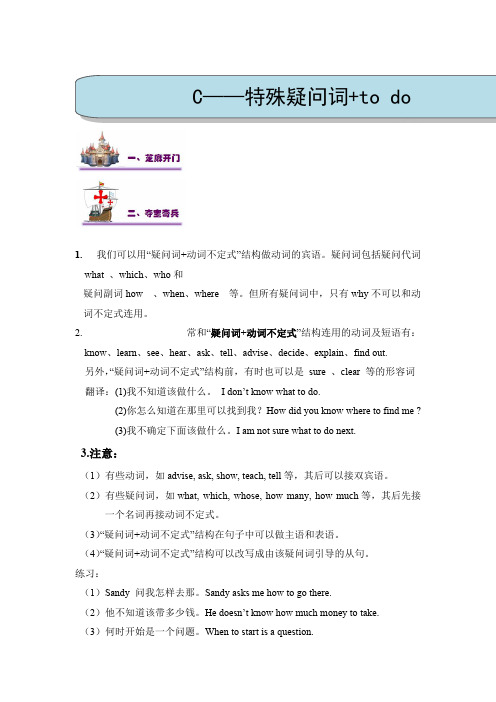
1. 我们可以用“疑问词+动词不定式”结构做动词的宾语。
疑问词包括疑问代词what 、which、who和疑问副词how 、when、where 等。
但所有疑问词中,只有why不可以和动词不定式连用。
2. 常和“疑问词+动词不定式”结构连用的动词及短语有:know、learn、see、hear、ask、tell、advise、decide、explain、find out.另外,“疑问词+动词不定式”结构前,有时也可以是sure 、clear 等的形容词翻译:(1)我不知道该做什么。
I don’t know what to do.(2)你怎么知道在那里可以找到我?How did you know where to find me ?(3)我不确定下面该做什么。
I am not sure what to do next.3.注意:(1)有些动词,如advise, ask, show, teach, tell等,其后可以接双宾语。
(2)有些疑问词,如what, which, whose, how many, how much等,其后先接一个名词再接动词不定式。
(3)“疑问词+动词不定式”结构在句子中可以做主语和表语。
(4)“疑问词+动词不定式”结构可以改写成由该疑问词引导的从句。
练习:(1)Sandy 问我怎样去那。
Sandy asks me how to go there.(2)他不知道该带多少钱。
He doesn’t know how much money to take.(3)何时开始是一个问题。
When to start is a question.ng (4)我的问题是在哪里可以找到答案。
My question is where to find the answer.一、单项选择( )1. —I will go to Harbin for my summer vacation. What about you ?—I haven’t decided where ______.A. goB. wentC. goingD. to go( )2. I haven’t decided when _____a holiday yet.A. tookB. takingC. to takeD. take( )3.—Can I help you ,dear? —Yeah, I do not know_____ a banana milk shake. Maybe you can help me.A. what to doB. when to makeC. how to makeD. why todo二、句型转换(同义句转换)1. He showed me how I can start the online tour.She showed methe online tour.2. I don’t know what he said.I don’t know _______ ______ _______.3. Tom forgot when he met his friendsTom forgot _____ ______ ______his friends. 4. Sandy is wondering where she asks for help.Sandy is wondering _______ ________ ________ for help.5. Amy does not know how she writes the report.Amy does not know _____ _______ _______ the report。
划线todosth的特殊疑问句
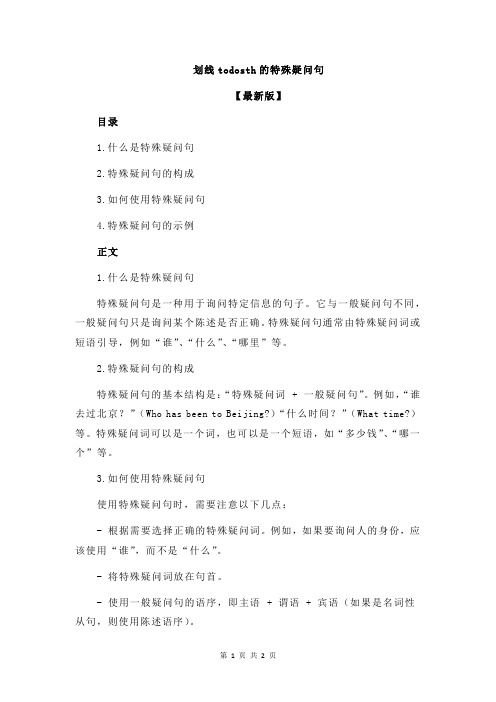
划线todosth的特殊疑问句
【最新版】
目录
1.什么是特殊疑问句
2.特殊疑问句的构成
3.如何使用特殊疑问句
4.特殊疑问句的示例
正文
1.什么是特殊疑问句
特殊疑问句是一种用于询问特定信息的句子。
它与一般疑问句不同,一般疑问句只是询问某个陈述是否正确。
特殊疑问句通常由特殊疑问词或短语引导,例如“谁”、“什么”、“哪里”等。
2.特殊疑问句的构成
特殊疑问句的基本结构是:“特殊疑问词 + 一般疑问句”。
例如,“谁去过北京?”(Who has been to Beijing?)“什么时间?”(What time?)等。
特殊疑问词可以是一个词,也可以是一个短语,如“多少钱”、“哪一个”等。
3.如何使用特殊疑问句
使用特殊疑问句时,需要注意以下几点:
- 根据需要选择正确的特殊疑问词。
例如,如果要询问人的身份,应该使用“谁”,而不是“什么”。
- 将特殊疑问词放在句首。
- 使用一般疑问句的语序,即主语 + 谓语 + 宾语(如果是名词性从句,则使用陈述语序)。
- 如果需要,可以在特殊疑问句后加上其他成分,如时间、地点等。
4.特殊疑问句的示例
以下是一些特殊疑问句的示例:
- 谁去过北京?(Who has been to Beijing?)
- 什么时候?(When?)
- 哪里?(Where?)
- 多少钱?(How much?)
- 哪一个?(Which one?)
总之,特殊疑问句是一种用于询问特定信息的句子,它由特殊疑问词和一般疑问句构成。
“特殊疑问词 动词不定式”的用法归纳

“特殊疑问词+动词不定式”的用法归纳一.由两部分构成:疑问词和动词不定式(wh-+to do)。
疑问词部分包括疑问代词who, whom, what, which和whose以及疑问副词when, where和how。
此外,连接词“whether”也适用.它主要具有以下几种功能:⑴当主语,如:● When to hold the meeting has not yet been decided.● Where to live is a problem.⑵当宾语,常接在forget, find out, discuss, decide, tell, teach, know, learn, wonder, remember等动词之后作宾语如:● We must know what to say at a meeting.● He could not tell whom to trust.● Do you know how to play bridge?⑶当表语,如:● The problem is where to find the financial aid.● The question is who to elect.⑷当名词同位语,如:● Tom had no idea which book to read first.● The question whether to confess troubled the girl.⑸用于宾语补足语,双重宾语。
某些动词后可接“sb.+ 疑问词 + 不定式”构成的双重宾语,这类动词常用的有advise, ask, show, teach, tell等如:● I can tell you where to get this book.● I ask her how to learn English.● He will advise you what to do.● Will you show me how to use the machine?(6) 作介词宾语:某些介词后面可接"疑问词+不定式"作宾语,这类介词常用的有about, as, from, in, of, on, with等。
特殊疑问词带to作宾语

An exhibition about _s_p_a_c_e_a_n_d__s_a_te_ll_it_e_s_.
Hello London
They decided to go tode satellite
space
spaceman
Choices:
3.Finish all the exercises in page78
Thank you and
good-bye
personally 就个人而言 就我而言,我喜欢跳舞多于唱歌 Personally, I enjoy dancing more than singing.
would rather do/not do 宁可做…../宁可不做… 我宁可骑单车去. I would rather go by bike.
Blank filling
exhibition
Unit 14 Satellites Lesson 53
Zhou Lan feels like _g_o_in_g__to__th_e__N_a_t_u_ra_l_H__is_to_r_y_M__u_s_e_u_m_. Jane would rather _g_o_t_o__th_e_S__c_ie_n_c_e_M__u_s_e_u_m__.
---Tom is not _t_a_ll __e_n_o_u_g_h __to__ pick the apples in the tree. ---Tom is __s_o__ short _t_h_a_t _ he can’t pick the apples in
the tree.
So far as I know 据我所知 据我所知,他有三个哥哥,五个姐姐. So far as I know, he has three brothers and five sisters.
- 1、下载文档前请自行甄别文档内容的完整性,平台不提供额外的编辑、内容补充、找答案等附加服务。
- 2、"仅部分预览"的文档,不可在线预览部分如存在完整性等问题,可反馈申请退款(可完整预览的文档不适用该条件!)。
- 3、如文档侵犯您的权益,请联系客服反馈,我们会尽快为您处理(人工客服工作时间:9:00-18:30)。
1. 我们可以用“疑问词+动词不定式”结构做动词的宾语。
疑问词包括疑问代词 what 、which 、who 和
疑问副词how 、when 、where 等。
但所有疑问词中,只有why 不可以和动词不定式连用。
2. 常和“疑问词+动词不定式”结构连用的动词及短语有:know 、learn 、see 、hear 、ask 、tell 、advise 、decide 、explain 、find out.
另外,“疑问词+动词不定式”结构前,有时也可以是 sure 、clear 等的形容词 翻译:(1)我不知道该做什么。
I don’t know what to do.
(2)你怎么知道在那里可以找到我?How did you know where to find me ?
(3)我不确定下面该做什么。
I am not sure what to do next.
3.注意:
(1)有些动词,如advise, ask, show, teach, tell 等,其后可以接双宾语。
(2)有些疑问词,如what, which, whose, how many, how much 等,其后先接一
个名词再接动词不定式。
(3)“疑问词+动词不定式”结构在句子中可以做主语和表语。
(4)“疑问词+动词不定式”结构可以改写成由该疑问词引导的从句。
练习:
(1)Sandy 问我怎样去那。
Sandy asks me how to go there.
(2)他不知道该带多少钱。
He doesn’t know how much money to take.
(3)何时开始是一个问题。
When to start is a question.
(4)我的问题是在哪里可以找到答案。
My question is where to find the answer.
一、单项选择
()1. —I will go to Harbin for my summer vacation. What about you ?
—I haven’t decided where ______.
A. go
B. went
C. going
D. to go
()2. I haven’t decided when _____a holiday yet.
A. took
B. taking
C. to take
D. take
()3.—Can I help you ,dear?
—Yeah, I do not know_____ a banana milk shake. Maybe you can help me.
A. what to do
B. when to make
C. how to make
D. why to do
二、句型转换(同义句转换)
1. He showed me how I can start the online tour.
She showed me the online tour.
2. I don’t know what he said.
I don’t know _______ ______ _______.
3. Tom forgot when he met his friends
Tom forgot _____ ______ ______his friends.
4. Sandy is wondering where she asks for help.
Sandy is wondering _______ ________ ________ for help.
5. Amy does not know how she writes the report.
Amy does not know _____ _______ _______ the report。
